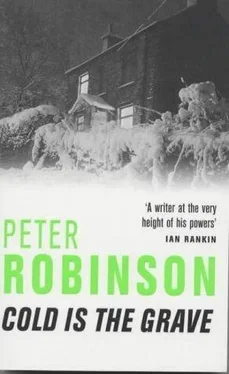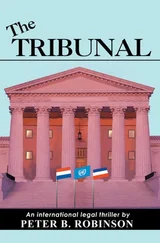Craig Newton, if that indeed was who it was, looked both puzzled and annoyed to find a stranger on his doorstep early on a Friday evening. Banks didn’t look like an insurance salesman – besides, how many salesmen still called at houses in these days of direct mail and electronic advertising? He also didn’t look like a religious type, or a copper.
“What are you collecting for?” Newton asked. “I’m busy.”
“Mr. Newton? Craig Newton?”
“Yes. What do you want?”
“Mind if I come in for a moment?”
“Yes, I do. Tell me what you want.”
“It’s about Louisa.”
Craig Newton stepped back a couple of inches, clearly startled. “Louisa? What about her?”
“You do know her, then?”
“Of course I do. If it’s the same person we’re talking about. Louisa. Louisa Gamine.” He pronounced it in Italian fashion, with a stress on the final e . “What’s wrong? Has something happened to Louisa?”
“Can I come in?”
He stood back and gave Banks enough room to enter. “Yes, I’m sorry. Please.”
Banks followed him down a narrow hallway into the front room. These old terrace houses weren’t very wide, but they made up for it in length, with both kitchen and bathroom tacked on at the back like afterthoughts. Comfortably messy, the first thing the room told Banks was that Newton probably lived alone. A number of magazines, mostly to do with photography or movies, littered the coffee table, along with a few empty lager cans. A TV set stood at the far end. “The Simpsons” was showing. There was also a faint whiff of marijuana in the air, though Newton didn’t appear stoned at all.
“Has something happened to Louisa?” he asked again. “Is that why you’re here? Are you a policeman?”
“Nothing’s happened to her as far as I know,” said Banks. “And no, I’m not a policeman. I’m looking for her.”
He frowned. “Looking for Louisa? Why? I don’t follow.”
“I’m her father.” The lies were starting to come rather more easily now, after just a little practice, and Banks wasn’t sure how he felt about that. Something to do with the end justifying the means crossed his mind and made him feel even more uneasy. Still, it wasn’t as if he hadn’t told plenty of lies in the course of his work, so why worry about it now he was doing the same thing as a private citizen? All in a good cause, if it could help a teenage runaway get herself sorted and get Jimmy Riddle off his back for good.
Craig raised his eyebrows. “Her father …?” Then he seemed suddenly to notice the developing tank he was shaking. “Shit. Look, I’ve got to finish this off properly or it’s a week’s work down the tubes. Come up if you like.”
Banks followed him upstairs, where Craig had turned his spare room into a makeshift darkroom. He didn’t need complete darkness for this stage of the process, so a dim light glowed on the wall. With expert, economic gestures, Craig emptied the tank of developer, poured in the stop bath and shook the tank again for a while. After that, he emptied it out again and poured in the fixer.
Banks noticed a number of photographs of Emily Riddle tacked to a corkboard. Not nude shots, but professional-looking folio stuff. In some she wore a strapless black evening gown and had her hair pinned up. In another she was wearing a vest and baggy jeans, showing her bare midriff with its spider tattoo, trying to look like Kate Moss or Amber Valletta.
“These are good,” he said to Craig.
Craig glanced over at them. “She could be a model,” he said sadly. “She’s a natural.”
The harsh chemical smells transported Banks back not to his life with Sandra, who was a keen amateur photographer, but to his childhood, when he used to go up to the attic darkroom with his Uncle Ted and watch him processing and printing. He liked the printing best, when the blank piece of paper went in the developing tray and you could watch the image slowly forming. It seemed like magic. Every time they went over, he pestered his Uncle Ted to take him up. There was a safe light on the wall, too, he remembered, just enough to see by, and it gave an eerie glow in the small room. But mostly it was the sharp, chemical smells he remembered, and the way constant exposure to the chemicals made his Uncle Ted’s fingernails brown, the same way nicotine stained Banks’s fingers when he started smoking. He used to scrub it off with pumice stone so his mother wouldn’t notice.
Then the visits to Uncle Ted’s stopped abruptly and nobody ever said why. It was years before Banks thought about those days again and managed to work it out for himself. He remembered his uncle’s hand on the small of his back, perhaps rubbing just a little, or the arm draped casually across his shoulders in an avuncular way. Nothing more. Never anything more. But there was some kind of scandal – not involving Banks, but someone else. Uncle Ted suddenly broke off his connection with the local Youth Club and no longer acted as a Boys’ Brigade leader. Nothing was said, no police were involved, but he was suddenly a pariah in the community. That was how things like that were dealt with back then in that sort of close working-class community. No doubt one or two of the local fathers lay in wait one night and gave him a beating, too, but Banks heard nothing about that. Uncle Ted was simply never mentioned again, and if Banks ever asked to go visit or mentioned the name, his mother’s mouth formed into a tight white line – a definite warning sign to shut up or else. Eventually, he stopped mentioning it and moved on to discovering girls.
“Okay,” said Craig, emptying out the fixer and inserting a hose attached to the cold water tap. “We’re all right for half an hour now.”
Banks followed him downstairs, still half-lost in memories of Uncle Ted, slowly moving to memories of Sandra, and how they made love in the red glow of her darkroom once.
Back in the living room, “The Simpsons” had given way to a documentary on Hollywood narrated in a plummy, superior accent. Craig turned the TV off and they sat down opposite one another in the narrow room.
Banks reached for his cigarettes; he’d been a long time without. “Mind if I smoke?”
“No, not at all.” Craig passed him a small ashtray from the mantelpiece. “I don’t indulge, myself, but it doesn’t bother me.”
“Not cigarettes, anyway.”
Craig blushed. “Well, a bit of weed never did anyone any harm, did it?”
“I suppose not.”
He continued to study Banks, his look wary and suspicious. “So, you’re Louisa’s father,” he said. “Funny, you don’t look Italian. She said her father was Italian. Met her mother in Tuscany or somewhere like that on holiday.”
“What did she say about me?”
“Not much. Just that you were a boring, tight-arsed old fart.”
Well, Banks thought, if you will go around assuming other people’s identities, you have to be prepared for the occasional unflattering remark – especially if that identity is Jimmy Riddle’s. On that score, Emily Riddle probably wasn’t far wrong. “Do you know where Louisa is?” he asked.
“Haven’t seen her for a couple of months,” said Craig. “Not since I moved out here.”
Banks showed him the photo. “This is the person we’re talking about, isn’t it?”
Craig looked at the photo and gasped. “You’ve seen them, then?”
“Yes. Is it the same girl we’re talking about?”
“Yeah. That’s her. Louisa.”
“My daughter. What happened? The photos on the Web site?”
“Look, I’m sorry. It was just a lark, really. It was her as much as me. More , really. Though I don’t expect you to believe me.”
“You took the photos?”
Читать дальше












